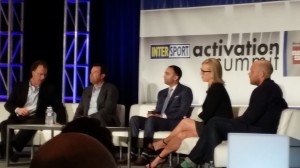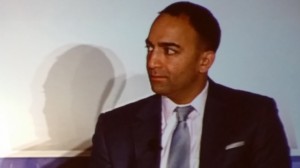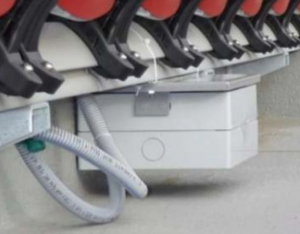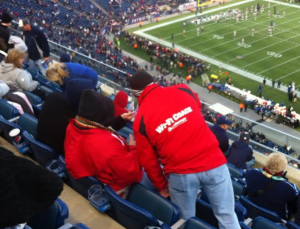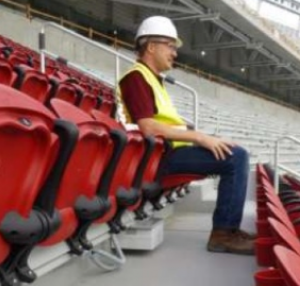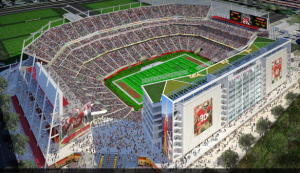“It better work, since we’ve been talking about it,” said Marathe Friday, during a panel discussion at the Intersport Activation Summit presented by SportsBusiness Journal/Daily in San Francisco. “We better be right.”
Even though the short history of in-stadium networks suggests that any new endeavor be launched with words of caution, Marathe and the San Francisco 49ers are instead confident — very confident — that their new stadium will launch with a network second to none, and have game-changing services like food and beverage delivery to seats and on-demand instant replay that will redefine the game-day experience.
In both his panel discussion at the Ritz-Carlton hotel and in an additional interview afterward, Marathe provided some additional details about plans the Niners have talked about previously for the technology features at the new stadium, which is located in Santa Clara, Calif., smack dab in the middle of Silicon Valley. Though Marathe said the stadium’s location — quite literally next door to several high-tech company campuses — made technology “part of the DNA,” he stressed Friday that the Niners are seeking to use technology to improve the fan experience, and not just to have cool stuff.“It’s not technology for technology’s sake,” Marathe said. “It’s to enhance being at the game.”
But he did add that the stadium’s Wi-Fi network will be the base for much of the innovation.
Wi-Fi is ‘the master key’
The Wi-Fi network, which Marathe said “will absolutely be working” when the park opens, is “the master key that unlocks everything,” he said. Currently being built with Wi-Fi access point gear from Aruba Networks and back-end network equipment from Brocade Networks, the Levi’s Stadium Wi-Fi network will also have twin 10-Gigabit broadband pipes provided by Comcast to provide what Marathe said will be throughput “30 times more than any other stadium.”Marathe said the Wi-Fi network is being built with what he calls a “spider web” of access points, though neither the Niners nor Aruba have yet said just how many access points will be used to create the network. There will also be a neutral-host cellular DAS at the stadium, built by DAS Group Professionals (DGP). Already, DGP has signed up the “big four” carriers of AT&T, Verizon Wireless, Sprint and T-Mobile, to use the DAS at the stadium.
What will the networks be used for? Marathe outlined four main points of technology innovation during his talk, including high-definition, on-demand replays via the new Niners stadium app; in-seat delivery of food and beverages to every seat; way-finding features to perform tasks like locating friends, finding parking spots, and to tell which bathroom lines are shortest; and paperless tickets, based on RFID and near-field communication to fans’ devices. Of the four, the replay idea and the food-delivery service stand out as massive technical and industrial challenges.
Promised: Better replays than those on TV
If there is one promise that has many in the stadium technology industry shaking their heads, it’s Marathe’s pledge of Levi’s being able to deliver “better replays than what the coaches are seeing,” since team coaches only get to see replays provided by the network broadcasts. The Niners, Marathe said, will have “a massive [internal] production crew” working on the replay feature, since replays not only need to be picked out of the video stream, they also need to be coded to work over the Internet and to be delivered to handsets. Though Marathe admitted that the video quality may dip a bit below true HD if a lot of fans try to watch replays at once, he told the conference crowd that the Niners’ stadium app is going to deliver “HD, slo-mo [replays] within seconds after a big play.”
While other stadiums, like Barclays Center in the NBA, use technologies like Cisco’s StadiumVision Mobile to deliver separate “channels” of live video and replays, Marathe said the Niners’ app will allow fans to choose their own replays and when they want to watch them. “If you have a [replay] channel, you’re subject to whatever is on that channel,” Marathe said.
The food-delivery feature, Marathe said, is more than putting a menu in an app — “it’s an immense industrial engineering exercise,” he said, to figure out things like how many runners are needed and when and how food needs to be prepared. In addition to food delivery — an option he said will be available to every seat in the 68,500-seat stadium — the Niners will also have “express pickup” lanes for digitally placed orders at concession stands, an idea that Marathe said helps eliminate or significantly reduce two of the three things that make concession interactions a time-consuming act.
“There’s decision time, transaction time, and preparation time,” Marathe said. “If you can eliminate two of three variables, that’s a few more minutes fans have to watch the game.” Waiting until fans show up at a stand to prepare the food will help keep the order fresh, he added.
Wayfinding, paperless tickets and the 9-Nerds
If there’s one idea that’s already gotten a lot of press, it’s the plan to have wayfinding technology assist features like the one that will let fans know how long the bathroom lines are. Marathe said the idea was to make it simple — “red light, yellow light, green light” — to let fans know that if they have to go, it might be faster to try the bathroom one section over.
“We’re really just trying to be smart,” said Marathe. Other wayfinding apps might include a parking-spot locator, or a friend-finder feature.
The fourth area where Marathe wants Levi’s to innovate in is paperless ticketing, which he said wouldn’t be 100 percent this year but it will eventually get there. A future scenario described by Marathe might use RFID or near-field communications to let fans simply walk through a gate without having to show a ticket or even a bar code to be scanned. Some ski areas, like Aspen and Vail in Colorado, already use such technology to let skiers get on lifts without having to show anyone their RFID-equipped lift tickets.
“The idea is to have greeters who can actually greet you” when you walk in, and perhaps extend a personal offer for discount goods purchases or seat upgrades, Marathe said. “It’s a more human interaction,” fueled by technology.
Finally, to help fans figure out how to use the new network and apps, Marathe confirmed plans previously reported by Mobile Sports Report to hire a crew of “network coaches” to roam the stands. According to Marathe the coaches will be called “9 Nerds” (say it quickly) and will likely be college students, dressed in what Marathe called “Poindexter outfits.” The Niners are looking to hire 150 such network helpers, which would be the largest such crew we’ve heard of in the stadium networking marketplace.“They’ll stand out,” Marathe promised.
Lots of network use — and a team ready for its launch
With all the hype about the network, Marathe expects that Levi’s Stadium wireless usage will far eclipse that at other stadiums, where often far fewer than half of the fans in attendance actually ever use things like Wi-Fi or stadium apps.
“Forget 10 percent [fan network use], we’re going to see something higher,” Marathe said. Even people who don’t have digital devices, he said, will probably borrow one “just to bring it to Levi’s to test it out.”
When asked why his team was so confident — in an industry where under-promising seems to be a sensible way to go — Marathe said that both the Silicon Valley heritage and the greenfield nature of the building gives the Niners and Levi’s a technological edge.
“Five years ago, we put together a kind of think tank with VCs and design people, and thought about what would be useful [at a new stadium], well before we ever put a shovel in the ground,” Marathe said. And even though the Niners’ CTO left the team earlier this year, Marathe is confident that his crew of 25 engineers (which he said also still gets some consulting help from the departed CTO, Kunal Malik) will deliver the network and apps as promised.
Having advanced technology in the new stadium, Marathe said, “was our mandate — the DNA of the building is all these tech companies that are around us. It’s who we are.”
